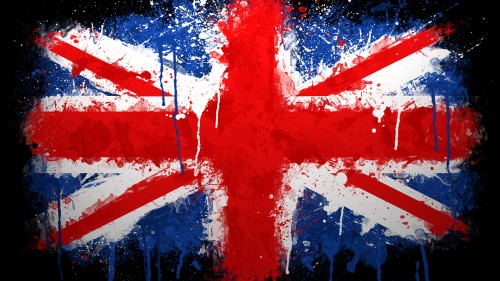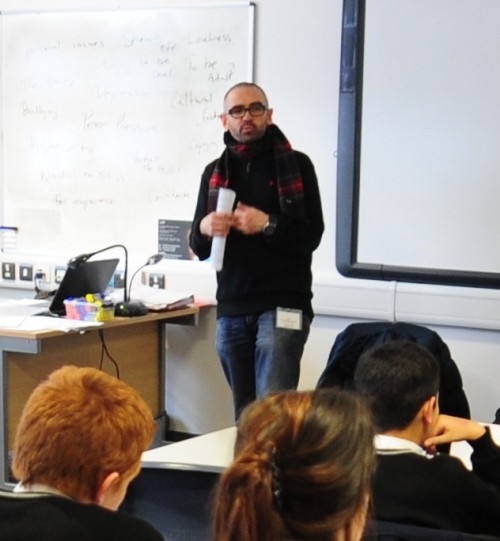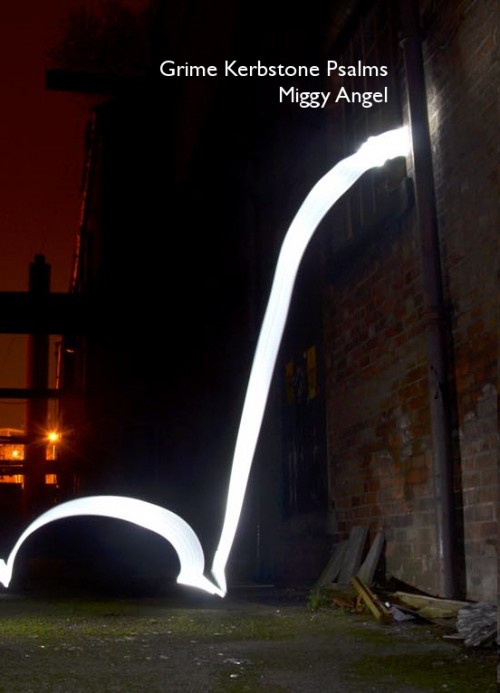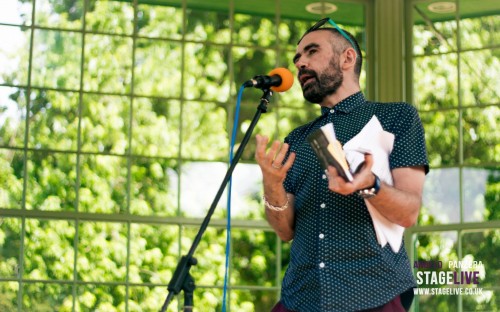U.K. Author Spotlight (2) – Miggy Angel
Realizing that they speak and read English in the U.K. and that they write in it too (and because I’m originally from South Africa a kind of diamond and veldt version of the U.K. with much better weather and beaches), I’ve decided to start a new feature that follows kind of in the vein of the Seattle Author Spotlight series. So, periodically, now, I will be featuring a U.K. author.
The first UK Author Spotlight was of Gary J Shipley and the 2nd one, now, is of Miggy Angel. Miggy and I met on Twitter. It was love at first tweet, really. Miggy’s a wonderful tweeter. And a wonderful writer too. Miggy is also just a plain old good guy. Not a hipster. Not an asshole. Just a good guy who also happens to be a wonderful writer. It is my pleasure, then, to be featuring Miggy here.
***
Brief Bio:
Miggy Angel is a poet, performer and workshop facilitator, born and raised in South London and currently resident in Nottingham. His first collection, Grime Kerbstone Psalms was published by Celandor books in February 2013. He is the co-organizer of the monthly poetry event, Speech Therapy – as well as the founder of the Do Or Die poets, and one half of the musical project We Bleed Ink, with producer/musician John Freer. He has work published online at Kill Author, 3AM Magazine, and elsewhere.
***
Brief Interview:
Rauan: your story (Miggy Angel’s) is of hard times, perseverance, redemption and resurrection. Can you share with us about your lowest point(s)
Miggy: Wow, Rauan, you’re straight in there. Lowest point? You mean apart from every time I walk down the road, and get my heart broken by every single thing I look at? I mean, I started trying to write whilst I was living in a half-way house, then a homeless person’s unit. So, yeah, there have been some low points along the way – mental-health related, addiction, etc. In many ways my life was a sole, protracted low point all of its own, over many years. The perseverance you mention was just me trying to write my way out of a very black and very deep hole. I don’t really go with the redemption and resurrection narrative, mainly because those words have certain religious connotations, and also because I’m still very much in the trenches my friend.
***
***
RK: In addition to your book (page poetry) you’re also a performance (spoken word) poet and you put your poetry to music as well, can you tell us about the advantages and disadvantages, challenges, opportunities, etc, of wearing these related but different hats?
MA: I definitely put more focus into crafting words on a page and trying to get books published than I do into performing poetry, but I’m also very much invested in the oral tradition of poetry. I love how the vocalising of a poem activates the apparatus of the body, and the communal space around the body – the body of the listener as well as the speaker. I suppose this all ties in with my commitment and enthusiasm for the communal function of poetry. As I see it, the challenge for poets when performing poetry has always been: how do we read the poem out loud without boring the world to tears? I don’t really use adjectives like ‘performance’ poet, or ‘spoken word’ poet. I began to notice how white, middle-class types who write poetry are called ‘poets’ – but working-class white, black, Hispanic, Asian writers, etc, who write poetry and maybe like to read aloud or perform their work, well we’re labelled ‘spoken word’. Those terms are all well and good if a person chooses them for themselves, but I think this labelling is sometimes used as a subtle way to exclude and disinherit certain groups from the wider body of poetry, by people who maybe have a proprietorial, hegemonic relationship to poetry. I said fuck that. I write poetry. I’m a poet. The act of calling myself a poet was really an act of survival for me. Throughout my life I’ve been subject to the classifications and diagnoses of others – mental-health, class, and addiction related, etc. The only diagnosis that ever really worked for me was when I called myself a poet.
***
***
RK: Can you please provide us a brief(ish) sample of your work? (Preferably from yr book, Grime Kerbstone Psalms) ?
MA:
The Phoenix
There’s this grinding feeling of having lost something. It grows around your heart like moss upon a tree. Just look at those green branches clawing after abdicated air. But of course, it was never a tree covered in moss, have you forgotten that as well? It was the house you grew up in, abandoned & moss-struck. Now, where did you put those keys? They say, “Go back inside the room where you had them last” – but the room is a shoebox sat atop the wardrobe, containing photographs of imposters wearing masks with your family’s faces painted on them. You can’t go back now, all the doors are sealed, & time, that sly devil, has cauterised the lanterns. Soon, you’ll remember how the phoenix was a fictional fowl created by a shepherd bored of his flock; but you’ll forget your own name & your mother’s birthday. All that you forget is not lost but awaits you in death. You exit your clothes & enter the water. The wind catches the open window & BANG. You remember everything.
***
RK: In the notes and foreword to your book you make it clear that Poetry for you was, and is, a way to take control, magically, actually, potently and Godlike, of what was for you a life that had lost its compass. And now you lead a workshop for budding writers in a similar place, similarly unmoored. Can you flesh this out a bit more for us?
MA: It’s difficult to neatly summarise or reduce to a description the way that poetry functions in my life. It isn’t really about taking control as such. It has definitely been about finding structure, and purpose, a craft and discipline to commit to – but when I credit poetry for kind of saving my life, I don’t just mean the actual writing of poetry. I also mean that poetry began to have a locating or situating or mooring effect on my life when I came into contact with the ‘poetic’. I don’t believe that poetry is dependent on language, or reliant upon forms arranged upon a page. Poetry to me is the very fabric of all things, the ground zero of existence. It’s the state of the universe, of the busy street outside your window, of every cell in your body. It’s fire and ice, birth and death and all points and co-ordinates in-between and beyond. I see everything as poetry. The way every thing resides beside the other, or doesn’t reside and is mortally restless, how it congeals or fractures, how it holds together or breaks apart. The biggest-kept secret in poetry is that you are the poem. I am the poem. We are the poem. Everything and everywhere is the poem. Poetry is writing us as we speak. Shhhh TELL EVERYONE. Honestly, I love poetry more than you’ll ever know. It hasn’t made me any promises or proffered me immunity of any kind, because broken promises and contagion are all poetry, too, but when I sought to bring my life in line with poetry’s energies and insistencies, things began to change for me.
I work in a drug project, where I facilitate a weekly creative-writing workshop for people in addiction, and I also take poetry workshops into schools in pretty deprived neighbourhoods – so I witness the transformative power of art on a regular basis – not just functioning in my life, but in the lives of others. Poetry, and the structure and focus which the practise of writing poetry offers, is a life-line, especially for those of us whose means of self-actualisation were limited. It’s creativity as oxygen, really.
***
RK: Your book’s dedicated to your “Mum (Sheila Ann James)”. Can you plz tell us a bit about your mum and your dedicating your book to her?
MA: The dedication at the front of the book is just me giving credit where it’s due. My mum brought me and my sister up as a single mother. I put her through years of total shit. I wouldn’t be here if it wasn’t for her. Also, all working-class communities are held together by women, many mothers, and single mothers whose roles go unrecognized. So I suppose it’s a subtle acknowledgement of that fact, too. I guess I’m also saying, Look, mum, my life wasn’t a complete waste! And thanks, coz I owe you big-time.
***
***
RK: Can you please give us a 2nd taste of your poetry? (and here can I talk you into providing a sample from your new manuscript which you’ve told me is darker and more Taboo than Grime Kerbstone Psalms)
MA:
Amphibian
Did you ever crawl into the bathtub
just to escape the cold, familialscalpel of the house? Have
you ever climbedinto a warm bath, just to avoid
the ruin of your entombed bedroom& lay down in the lagoon
of your own flotsam & jetsam, as if returnedto your mother’s womb? &
did you close your eyes & seethat pretty girl alive, before
the assassin of promise assigneda barb of gnarled hurt to her fated days, &
pray to her to never meetyour lecherous father beneath
that old oak in the autumn park? Didyou lay down under that lukewarm water,
eyes closed, & askyour mother
in an amphibian tongueto leave you unborn?
Did you drown?
***
RK: In spite of all the difficulties and grime detailed what’s really appealing, also, is that the personality of the poetry has a winking, good-natured, upbeat aspect to it. Is this just genetic? A product of perseverance? Some sort of combo?
MA: Yeah, people say that Grime Kerbstone Psalms is a tough read and pretty dark – themes of drugs, the effects of crack on the neighbourhood, urban poverty, social housing, gentrification, kids with guns, violence, etc – but I agree with you, there is also something maybe slightly whimsical about the tone of some of the poems. Obviously, I don’t write memoir, but in Grime I was taking difficult life-material and channeling it through the alchemical apparatus of poetry, maybe in order to exorcise it, or transmute it. Turning shit into gold. And even though the content is tough, there’s a kind of wild joy in that process, too, and maybe that comes through in the reading experience. I feel like I’ve really moved away from the style of that book. I’m writing out of very taut and wrought psychological/emotional spaces at the moment. I want to commit accidents of utterance. I want to perjure myself in my poetry. Just put a bomb under my tongue, and whatever collateral passes through the prism of craft and sticks to the page, gets to be the poem. Some poems are like gauze for the wound. Right now I want to write poems that are the wound.
***
RK: You mentioned to me, previously, that you thought your new manuscript might be better received (more easily published, too) in the U.S. than in the U.K. Why? (give us your take, that is, on the difference between poetry in the U.S. and the U.K.– audience and publishers).
MA: I can’t remember exactly what I might have said to you before, but I don’t think it’s easy to get a book placed anywhere. My current manuscript is very dark. It concerns sexual abuse, and is pretty explicit at times. The poem I’ve just shown you, ‘Amphibian’, is from the manuscript, and is one of the milder pieces. For some reason, I feel as though the process this manuscript may need to go through would probably be more coherently mapped with a publisher in the States. But I should be so lucky, y’know? America has a very rigorous poetry culture, which I like, and I think there’s generally an appetite over there to confront the dark material of life. Maybe I have a bias for American poetry. The literature I first loved was American. Mainly Southern literature. I loved the working-class idioms and rhythms and music and soulfulness, the focus on people existing on the margins, and the spectrum of blood and light which I found within that writing. I could relate to it, and it felt to me as though it was giving a kid like me, from where I was from, permission to exist in literature. It was saying, “It’s ok. Go write your territory.” Whereas, when reading English lit, I felt that my experience was kind of denied, or unwritten, or excluded. Also, right from the moment I started becoming visible on-line and engaging with other poets/writers, my most meaningful and generous relationships have been with American writers. This generosity and inclusivity has meant a lot to me. I’d like to take this opportunity to say cheers.
***
RK: I love your tweets, man. Some writers are really into Twitter and others avoid it like the plague. Tell us, Miggy, plz, about you and Twitter? ( and is it true that British writers have to be sipping tea while Tweeting?)
MA: Being a half-Spanish Cockney with a crow for an id, I tend to tweet whilst washing a gypsy woman’s feet in a bowl of goat’s blood. I have a love/hate thing with Twitter. The accounts I really like to read on there are those people that don’t necessarily consider themselves writers, but write the most creative stuff, these lithe and wild leaps of thought. They’re like modern-day jazz greats of associative thinking. But Twitter’s addictive, too, and wants blood I don’t have to give it, coz I need that blood for my poems. I don’t really feed that lil blue bird anymore, to be honest. I’ve met some cool, literature-crazy people on Twitter, though, who’ve become friends and co-conspirators, so there’s always that.
***
RK: What sort of poem would you recommend for the next British Monarch’s coronation? (and would you write it?)
MA: If you look really closely, every poem I’ve ever written and ever will write has an anti-Monarchy subtext! A Scottish poet that I love and whose writing engages and confronts issues of elitism and class-negation in culture and language is Tom Leonard. He was and is a very important writer to me. A Tom Leonard ‘coronation poem’ would never happen, but it would probably be the only one I’d be interested in reading. Go read his poem ‘Unrelated Incidents’ – No. 3
***
***
Tags: Miggy Angel, U.K. Spotlight





tinyurl.com/kk6tldj
What a fantastic interview, thanks for posting this conversation. Packed full of meaningful insights and reflections. Short, to the jugular and worth reading. Good job.